Jordan and the United Arab Emirates parachuted 25 tons of aid into the Gaza Strip on Sunday in their first airdrop in months, a Jordanian official said.
The country has confirmed that it has carried out three airdrops over Gaza, including one in co-operation with the United Arab Emirates.
An official said the air drops were not a substitute for delivery by land, as it is also sending in 60 trucks carrying essential food supplies, the country’s state-run news agency reports – while Egypt is also delivering more aid by land.
Two Jordanian C-130 planes and one United Arab Emirate aircraft were involved in the mission and targeted several locations within the embattled Gaza Strip.
Jordanian state TV added that the latest delivery of aid brings the total number of airdrops by the nation to 127 since the start of the war in Gaza.
Although some experts have questioned the practicality of airdrops to feed Gaza’s approximately two million people.
Calls for ‘humanitarian corridors’ to allow for more trucks with aid to access Gaza continue to sound as the region faces yet more food shortages.
It comes as Israel announced a ‘tactical pause’ to fighting in populated parts of Gaza to address a surge in hunger and allow in UK-backed aid air drops.
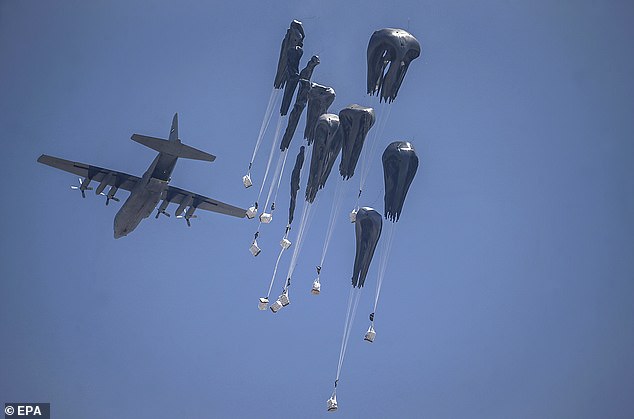
Humanitarian aid is airdropped by the Royal Jordanian Army over the northern Gaza Strip on July 27
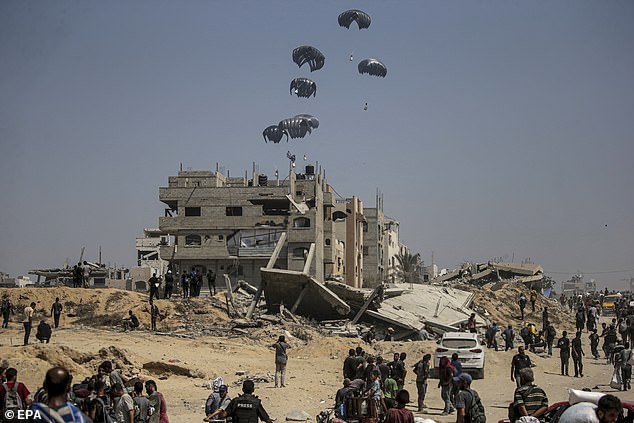
Jordanian state TV added that the latest delivery of aid brings the total number of airdrops by the nation to 127 since the start of the war in Gaza
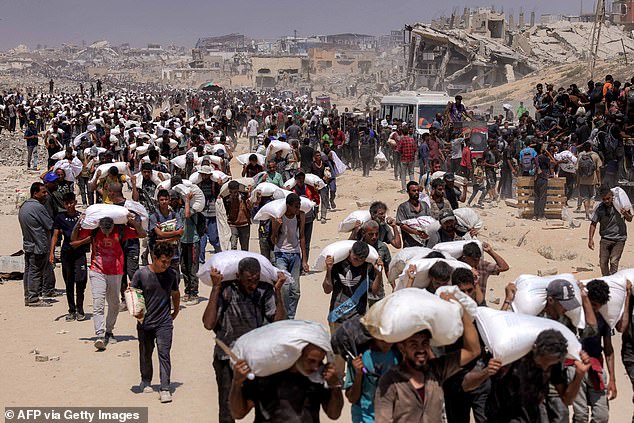
People walk with sacks of flour delivered after trucks carrying humanitarian aid entered northern Gaza on July 27
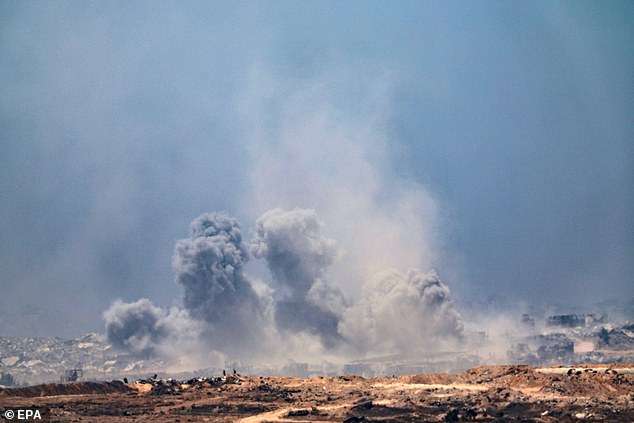
Smoke rises from an Israeli airstrike in the northern part of the Gaza Strip near Beit Hanoun, as seen from the Israeli side of the border, July 27, 2025
The steps mean food can now enter the regions for 10 hours a day as Israel faces a wave of international criticism over its conduct in the 21-month conflict.
A pause to fighting will begin from today, taking place between 10am and 8pm in Gaza City, Deir al-Balah and Muwasi – three areas of the territory with large populations, to ‘increase the scale of humanitarian aid’ entering the territory.
The Israeli military also stated it has carried out aid airdrops into Gaza, including packages of aid with flour, sugar and canned food.
Prime Minister Keir Starmer condemned the ‘utterly horrifying’ images of children starving, adding ‘news that Israel will allow countries to airdrop aid into Gaza has come far too late’.
Food experts have warned for months of the risk of famine in Gaza, where Israel has restricted aid because it says Hamas siphons off goods to help bolster its rule.
Images emerging from Gaza in recent days of emaciated children have fanned global criticism of Israel, including by close allies, who have called for an end to the war and the humanitarian catastrophe it has spawned.
Israel said the new measures were taking place while it continues its offensive against Hamas in other areas.
On Sunday afternoon, Israel’s Prime Minister Benjamin Netanyahu made his first comments since the military announced the series of measures to boost humanitarian aid into Gaza.
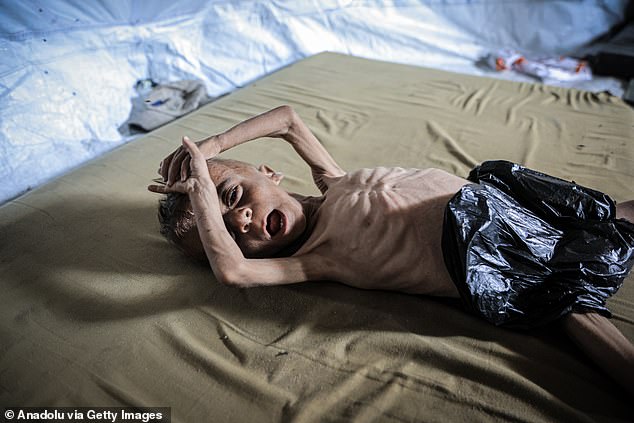
More than 1,000 Palestinians have been killed by Israeli forces since May while trying to get food, the UN human rights office says (picture taken on July 21)
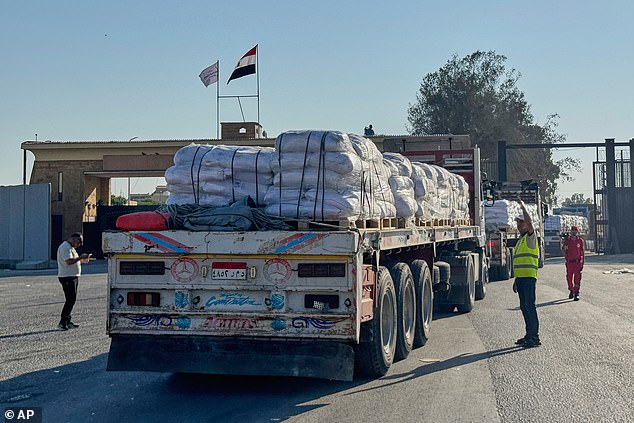
Trucks carrying humanitarian aids enter the Rafah crossing between Egypt and the Gaza Strip today
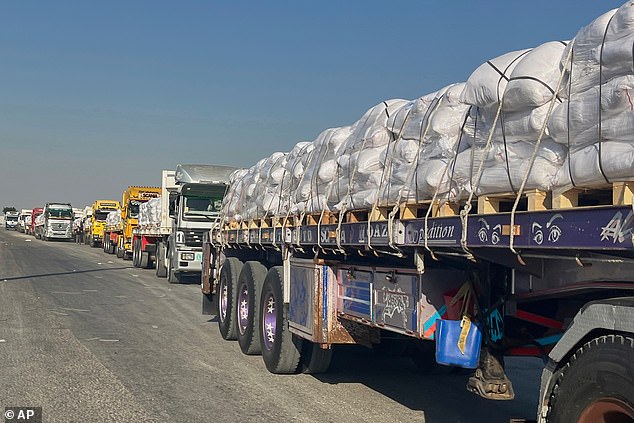
The military said it would begin a ‘tactical pause’ in Gaza City, Deir al-Balah and Muwasi, three areas of the territory with large populations, to ‘increase the scale of humanitarian aid’ entering the territory
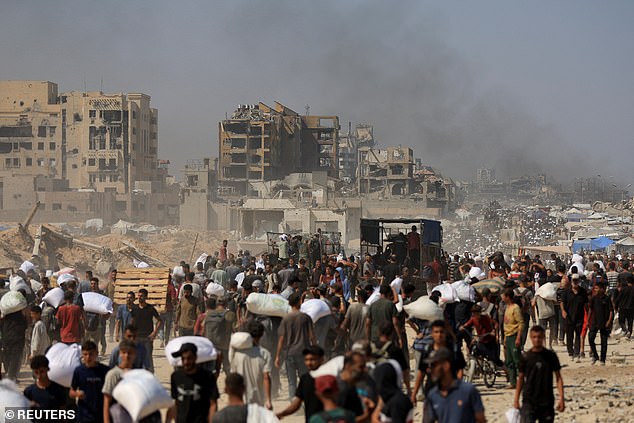
Palestinians carry aid supplies that entered Gaza through Israel, in Beit Lahia in the northern Gaza Strip
In a video statement, he said that while Israel continues its fighting in Gaza, the country has got to allow the entry of ‘minimal’ humanitarian supplies.
The prime minister claimed that Israel has always allowed aid into Gaza, and that the UN has blamed his government for the crisis Palestinians are facing.
He said: ‘There are secure routes. There have always been, but today it’s official. There will be no more excuses.
‘We will continue to fight and we will continue to act until we achieve all of our war goals – until complete victory.’
The local pause in fighting came days after ceasefire efforts between Israel and Hamas appeared to be in doubt.
On Friday, Israel and the US recalled their negotiating teams, blaming Hamas, and Israel said it was considering ‘alternative options’ to ceasefire talks with the militant group.
After ending the latest ceasefire in March, Israel cut off the entry of food, medicine, fuel and other supplies completely to Gaza for two and a half months, saying it aimed to pressure Hamas to release hostages.
Under international pressure, Israel slightly eased the blockade in May.
Since then, it has allowed around 4,500 trucks for the UN and other aid groups in to distribute.
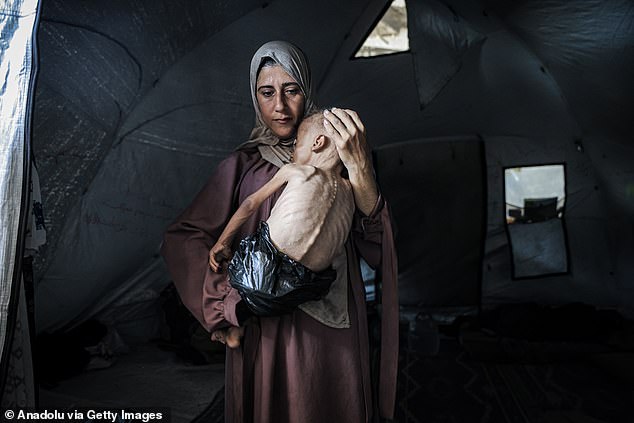
Muhammad Zakariya Ayyoub al-Matouq, a 1.5-year-old child in Gaza City, Gaza, faces life-threatening malnutrition as the humanitarian situation worsens due to ongoing Israeli attacks and blockade
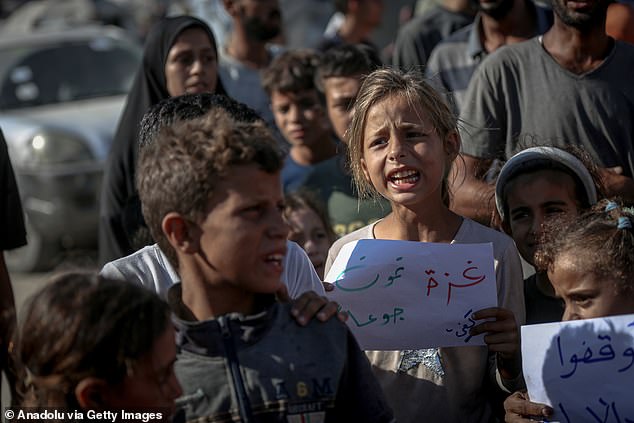
Palestinian journalists, children, and families gather to demand an end to Israeli attacks and the entry of humanitarian aid, on July 19
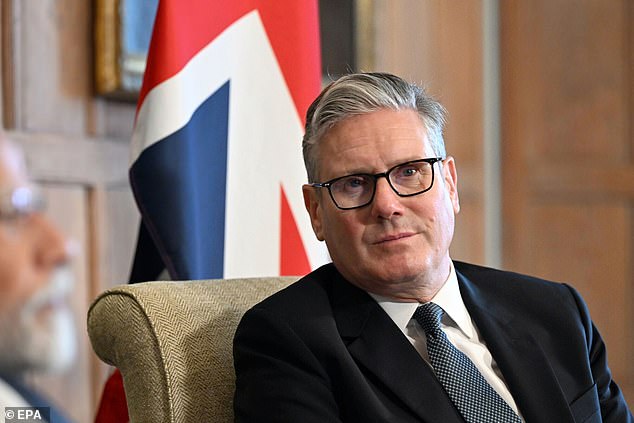
Keir Starmer said: ‘The images of starvation and desperation in Gaza are utterly horrifying’
The average of 69 trucks a day, however, is far below the 500 to 600 trucks a day the UN says are needed for Gaza.
The UN says it has been unable to distribute much of the aid because hungry crowds and gangs take most of it from its arriving trucks.
As a way to divert aid delivery away from the UN, Israel has backed the US-registered Gaza Humanitarian Foundation, which in May opened four centres distributing boxes of food supplies.
More than 1,000 Palestinians have been killed by Israeli forces since May while trying to get food, mostly near those new aid sites, the UN human rights office says.
As a way to divert aid delivery away from the UN, Israel has backed the US-registered Gaza Humanitarian Foundation, which in May opened four centres distributing boxes of food supplies.
Israel has railed against the UN throughout the war, saying that its system allowed Hamas to steal aid, without providing evidence.
The UN denies that claim and says its delivery mechanism was the best way to bring aid to Palestinians.
The military said the new steps were made in co-ordination with the UN and other humanitarian groups.
Much of Gaza’s population, squeezed by fighting into ever tinier patches of land, now relies on aid.
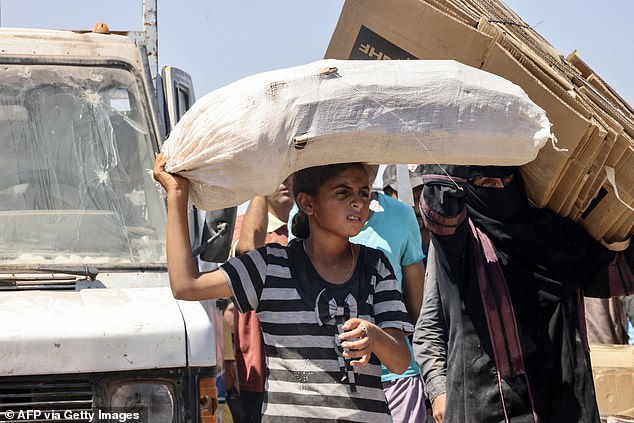
A Palestinian girl carries a bag of food aid as a woman transports empty cardboard boxes on her shoulder in the al-Mawasi camp in Rafah in the southern Gaza Strip
Recent conflict was sparked following Hamas’s attack on southern Israel on October 7, 2023, saw militants kill 1,200 people, mostly civilians, and took 251 hostages.
Hamas still holds 50 hostages, more than half of them believed to be dead.
Israel’s retaliatory offensive has killed more than 59,700 Palestinians.
The count doesn’t distinguish between militants and civilians, but the Palestinian Health Ministry says that more than half of the dead are women and children.
It is understood that Sir Keir will press Donald Trump at a meeting in Scotland on Monday as to whether more can be done to stop the conflict.
While the Prime Minister will urge for securing a ceasefire, it is feared this will raise the risk of a clash with Mr Trump who has insisted Hamas does not want peace.
Sir Keir said: ‘Israel must allow aid in over land to end the starvation unfolding in Gaza. The situation is desperate.
‘We are urgently accelerating efforts to evacuate children who need critical medical assistance to the UK for treatment.’
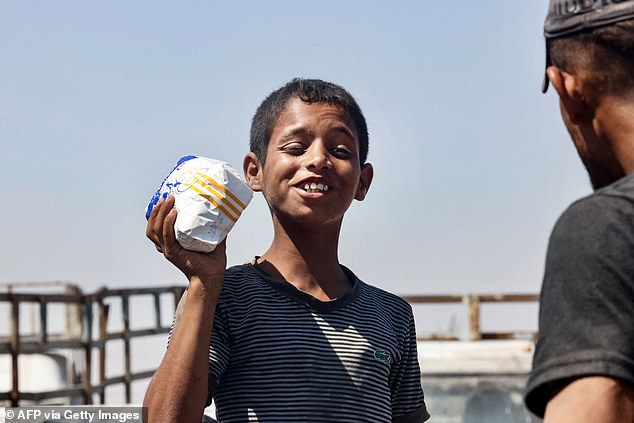
A Palestinian boy reacts as he carries a bag of flour in the al-Mawasi camp in Rafah in the southern Gaza Strip
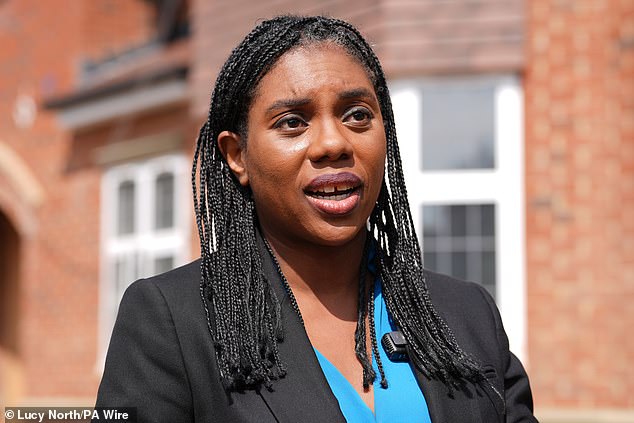
Conservative Party leader Kemi Badenoch has said pictures of children starving in Gaza has not wavered her support for Israel
Britain is working with Jordan on plans to airdrop aid into Gaza and evacuate children needing medical assistance.
However, the head of the UN’s Palestinian refugee agency has warned the efforts are ‘a distraction’ that will fail to properly address deepening starvation in the strip, and could in some cases harm civilians.
UNRWA chief Philippe Lazzarini said: ‘A manmade hunger can only be addressed by political will.
‘Lift the siege, open the gates and guarantee safe movements and dignified access to people in need.’
The Israel Defence Forces (IDF) also claimed there was ‘no starvation’ in Gaza, despite increasing accounts of malnutrition and starvation-related deaths.
Conservative Party leader Kemi Badenoch has said pictures of children starving in Gaza has not wavered her support for Israel.
She told Sky News’ Sunday Morning With Trevor Phillips show: ‘War is a difficult situation and what I see when I see Israel is a country that is trying to defend itself, mostly from Iran and a lot of its proxies, Hezbollah, Hamas, the Houthis. I think they are in a very difficult situation.
‘What worries me is that the length of time that this war has been going on is making it very difficult for the people in the Palestinian territories and also for Israel.
‘We need to bring things to an end.’
The comments come amid Israel’s continued occupation of the Palestinian territories and the Golan Heights – understood to be the longest military occupation in modern history.












